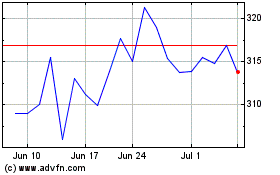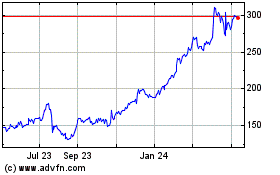By Suzanne McGee
Some mutual-fund managers will look back on 2020 as the worst of
times. Others are having the time of their lives, posting
year-to-date returns of 75% or more.
The difference between the winners and the laggards is
relatively straightforward: the extent to which portfolios were
heavily weighted with stocks of companies that stand to benefit
disproportionately from disruptive change. Some of these have
become household names, like Zoom Video Communications Inc., whose
visibility and share price have soared since the Covid-19 pandemic
lockdowns forced billions of people to reimagine their lives.
Others are less well-known, like medical genetic testing company
Invitae Corp. (up nearly 500% from its lows in March), or Coupa
Software Inc. (which delivers a cloud-based spending-management
platform to help businesses get a grip on costs), up 155% since
March's market meltdown.
"We would never have guessed that a pandemic-related recession
would have led companies to reimagine the way they do business so
rapidly," says Anthony Zackery, one of the portfolio managers
overseeing several top-performing mutual funds at Zevenbergen
Capital Management. "They had planned to execute changes slowly,
over years, but those adoption windows for new technologies have
been compressed to months."
Zevenbergen's growth-stock funds captured three of the 10 top
spots in The Wall Street Journal's third-quarter survey of the
best-performing actively managed U.S. equity funds, based on their
returns over the trailing 12 months. Of these, Zevenbergen Genea
Fund (ZVGIX) triumphed in our quarterly Winners' Circle competition
by posting a return of 121% for the 12-month period ended Sept. 30,
and a year-to-date gain of 92%.
Our quarterly survey limits its scope to the universe of
actively managed and diversified U.S. equity funds with more than
$50 million in assets and a track record of at least three years,
and draws on data provided by Morningstar Inc. Not included: sector
funds, funds that employ leverage or derivatives to boost returns
or cushion losses, blended funds including fixed income, global
funds or quantitative funds that rely on models or algorithms to
build their portfolios rather than traditional fundamental
research.
The results aren't intended to give readers a "buy" list of
mutual funds guaranteed to continue delivering stellar returns.
Some of the share classes may be less-accessible to ordinary
investors, or carry unacceptably high fees.
Narrow window
Because the survey emphasizes returns for the trailing 12
months, it can emphasize shorter-term performance, which may be
less useful for investors seeking funds able to outperform for the
next five to 10 years. Of course, this list may showcase funds that
simply aren't suitable for every investor's asset-allocation
strategy or risk tolerance. However, examining these top-performing
funds and delving into their strategies and holdings can give
investors insight into the way top-performing managers approach
specific market opportunities and evaluate potential
investments.
In 2020, argues Joe Dennison, another member of the Zevenbergen
portfolio team, "there is a scarcity of exceptional companies and
founders in which to invest," and being able to identify businesses
likely to deliver true growth in both revenues and earnings
regardless of the economic backdrop is crucial. Genea typically
owns positions in only 25 to 35 companies, compared with as many as
45 positions in Zevenbergen Growth Fund (ZVNIX), which ranked
fourth in our quarterly contest, with a trailing 12-month return of
114%.
Returns like that certainly grab an investor's attention in the
midst of a broad market environment that remains both volatile and
uncertain.
Over the 12 months ended Sept. 30, the S&P 500 index has
gained 16%. Year-to-date, while the 10 best actively managed
funds that met our criteria provided gains of at least 73%, the
S&P 500 advanced 3.25%. Moreover, as of Sept. 30, the entire
universe of actively managed, diversified U.S. equity funds with
more than $50 million in assets and a three-year track record
posted an average loss/gain for the trailing 12-month period of
8.7%, according to data from Morningstar.
True, the index's recovery from its lows in March, when the U.S.
economy was largely shut down to fight the pandemic, are
significant. But top-performing funds' emphasis on the handful of
stocks that actually seem likely to continue to benefit from
pandemic-related issues as well as longer-term secular trends has
helped them trounce the index.
"A lot of managers are focused on the question of 'how can I
beat the index?' which we think is backward-looking," says
Catherine Wood, CEO of ARK Investment and manager of American
Beacon ARK Transformational Innovation Fund (ADNIX). For Ms. Wood,
the index -- any index -- is irrelevant; she says her fund's
returns of 116% for the trailing 12 months and 85% for the year to
date -- putting her in second place for our contest -- come from
trying to imagine what the world will look like in five to 10
years. The fund then looks for companies that will profit most from
that transformation, based on a research strategy that favors
"innovation platforms" like robotics, DNA sequencing, energy
storage, blockchain technology and artificial intelligence.
Tesla's time
This approach led ARK's team to invest in Tesla Inc. about five
years ago; for the past three years, Ms. Wood says, it has been the
fund's top holding. That means that investors have benefited
handsomely from the nearly 10-fold explosion in Tesla's share price
over the last 12 months, a surge that occurred even though drivers
of Tesla's electric cars might have been expected to stay home
during a pandemic lockdown while new buyers might have postponed
purchases.
That conventional analysis of Tesla as no more than an
automotive company misses the point, Ms. Wood says. "That's the
most narrow way of looking at it," she says."It's actually a
robotics company, it's an energy storage company because of its
emphasis on battery technology, and it's an artificial intelligence
company because of the evolution of autonomous vehicles." The icing
on the cake? Tesla is expanding its global footprint, she says,
while also taking steps toward making its vehicles more affordable
for the mass market.
Tesla also is a top holding in the three Zevenbergen funds in
our survey, and was the single-largest holding for the Genea Fund.
"No, it's not a company that benefits from pandemic-related
trends," Mr. Dennison acknowledges. Rather, he believes that it
will emerge as a long-term beneficiary of the transformation that
Covid-19 is causing.
"Once the virus hit, more investors started recognizing that the
world had just changed," says Ms. Wood, who agrees with the
Zevenbergen analysis. "Now, the question is how we capitalize on
that change."
Many of this quarter's top-performing funds in our survey are
benefiting from companies that they and others believe will
dominate the post-pandemic business and market landscape. The
Zevenbergen and ARK funds all include Square Inc. in their top
holdings, as do several funds overseen by Dennis Lynch, head of the
Counterpoint Global team at Morgan Stanley Investment Management,
including our third-place finisher, Morgan Stanley Institutional
Discovery Portfolio (MPEGX). The latter recorded a gain of 115% for
the 12 months ended Sept. 30, while two other Morgan Stanley growth
funds -- Morgan Stanley Insight (CPODX) and Morgan Stanley
Institutional Growth (MSEQX) also showed up in the list of the 10
best-performing funds for the period yet again, with returns of
105% and 99%, respectively.
Square, whose share price has nearly tripled in the past 12
months, is a provider of a contactless payment system used by
retailers. Its allure for Ms. Wood and other investors goes beyond
its ability to offer contactless transactions. The company is
morphing into a new breed of financial services company that Ms.
Wood believes will be a long-term threat to commercial banks, with
their high fixed costs and a relative lack of innovation. "Square
helped deliver PPP [Paycheck Protection Program] funds to small
businesses, and it has calculated that 60% of the small businesses
who used it to get those funds were new to Square and have now
adopted its platform" for other uses, she says.
Three-part market
Mr. Lynch, for his part, says he believes that the stock market
this year has split into three parts. The smallest of the three
consists of stocks like Square, Tesla, Zoom, Spotify Technology SA
and Twilio Inc., companies at the leading edge of innovation and
post-pandemic transformation. By far the largest group, he argues,
is made up of businesses that Covid-19 has affected in
unpredictable ways and that have little visibility in terms of
earnings or revenue growth as they try to navigate the recession.
Then there's the third group: companies whose revenues and profits
rely on people getting together in person, like travel businesses,
some commercial real estate and restaurants. "Many of these have
suffered significant [stock-]price shrinkage," says Mr. Lynch.
"That seems logical to me."
This "trifurcation" of U.S. equities, Mr. Lynch says, means that
more investors likely will seek out just the kind of stocks in
which our top-performing mutual-fund managers have been investing
for years. Already, valuations for many are soaring, prompting Mr.
Lynch and others to wonder "whether some of the beneficiaries have
come too far, too fast" and whether at least some of the businesses
in the largest group have seen share prices tumble enough to make
them interesting value investments.
For now, at least, Mr. Lynch says that he doesn't see many
compelling alternatives to his current portfolio holdings, and that
he's happy with what he owns. "Many of them are still early in
their life cycle; many have founders or management teams with a lot
of skin in the game." If he is tempted to take some of his profits
off the table, he has to consider where else to put that money --
and those options are relatively few.
Other top-performing managers don't worry much about climbing
price-to-earnings ratios and other metrics, especially in light of
the astonishing low interest rates and forecasts of lower GDP
growth. Ms. Wood suggests that "with a new normalized growth rate
[including inflation] of 2% to 3%, the new normal for earnings
multiples for true growth companies could be 33 to 50 times,"
instead of 25 times earnings, as it was in the pre-pandemic
market.
In Ms. Wood's view, the soaring values of stocks in companies
that benefit from pandemic-accelerated transformation simply means
that innovation is being valued more appropriately by the market.
She thinks these businesses are capable of delivering sustained
growth of 25% a year, even if the overall economy and market are
stuck in the doldrums.
If these top-performing fund managers are correct in their
assessment of what lies ahead, the real longer-term winners will be
those investors able to accurately winnow out those resilient
companies capable of thriving in tough times by solving problems
for both consumers and businesses. Index investing may be less
costly, but this kind of active stock-picking is the strategy most
likely to deliver above-average returns consistently, they contend.
Especially if pandemic-related economic struggles re-emerge and
continue.
"There's a tendency to think that we're at the end point of the
crisis," says Mr. Lynch. "But I think we're still in the middle of
it."
Ms. McGee is a writer in New England. She can be reached at
reports@wsj.com.
(END) Dow Jones Newswires
October 04, 2020 20:52 ET (00:52 GMT)
Copyright (c) 2020 Dow Jones & Company, Inc.
Spotify Technology (NYSE:SPOT)
Historical Stock Chart
From Mar 2024 to Apr 2024

Spotify Technology (NYSE:SPOT)
Historical Stock Chart
From Apr 2023 to Apr 2024
